For Turkey EU membership is a strategic goal, how about the EU?
Adelina Marini, September 30, 2010
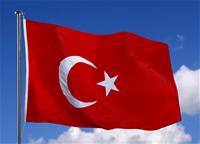 The European Union cannot be a global player unless it is a regional one, meaning that it has to have solved its problems on its own continent. This was one of the key messages of the European Council on September 16, dedicated for the first time entirely on foreign policy. What is the situation with Turkey then? In fact, in order to respond to this question we should first ask another one - does the EU want Turkey to be a member or it prefers to consider it as a strategic partner or something in the middle, mentioned not once - privileged partnership.
The European Union cannot be a global player unless it is a regional one, meaning that it has to have solved its problems on its own continent. This was one of the key messages of the European Council on September 16, dedicated for the first time entirely on foreign policy. What is the situation with Turkey then? In fact, in order to respond to this question we should first ask another one - does the EU want Turkey to be a member or it prefers to consider it as a strategic partner or something in the middle, mentioned not once - privileged partnership.
Unfortunately, there is no unambiguous answer to the second question. As such we could assume the fact that after all Turkey is an EU candidate and is holding accession negotiations. It is these negotiations, however, that constantly raise the same question - does the EU want Turkey for its member or not. On a European level currently no one is looking for an answer. At a Member States level though, from time to time different positions are being heard, the strongest of which are of France and Britain. France - as an opponent of a fully fledged membership of our South-East neighbour and Britain - on the contrary.
The big issue with not holding such a conversation, however, is that Turkey is constantly emancipating itself from the EU as a strategic goal. As Sinan Ulgen writes, chairman of EDAM/Centre for Economic and Foreign Policy Studies, an Istanbul-based think-tank in a publication for the London-based pro-European think-tank Centre for European Reform, the objective of membership is purely political.
"A country that seeks to join the club must adopt the EU’s political values and norms, as laid down in the Copenhagen accession criteria. The process of joining, however, is largely technical. A country needs to negotiate dozens of chapters of EU
law and policies, from farm subsidies to chemical standards. This process has no political milestones other than the opening of accession talks and, eventually, their conclusion. Turkey’s accession never fully turned into this technical process", he writes.
In fact, the biggest problem in EU-Turkey relations remains the heavily burdened 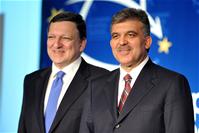 political issues like Cyprus's division, the debate on a privileged partnership and the fundamental questions about Turkey's place in Europe. Because of them, the Turks started to regard the EU as an antagonistic entity rather than an ally and a future partner. In the heart of this feeling, however, lay other political processes in Turkey itself.
political issues like Cyprus's division, the debate on a privileged partnership and the fundamental questions about Turkey's place in Europe. Because of them, the Turks started to regard the EU as an antagonistic entity rather than an ally and a future partner. In the heart of this feeling, however, lay other political processes in Turkey itself.
As Sinan Ulgen points out, although Turkey has been holding multi-party elections since 1946, the country is still in transition to a fully functioning democracy. "Because of its turbulent history, geographical location in an unstable region and complex society, Turkey is still grappling with fundamental questions about its social and political order. The trauma caused by the break-up of the Ottoman Empire resulted in an overriding concern for the unity of the nation state. Internal and external security took priority over the development of a pluralistic democracy and the protection of individual rights and freedoms. The fact that Turkey was a frontline state during the Cold War further underpinned this ordering of priorities. Even after 1990, large parts of the political class and the electorate remained convinced that the need to maintain a cohesive society and avert external threats justified restrictions on political opposition, minority rights and the role of religion in public life".
By the way, Turkey itself also uses the term "strategic partnership" in order to describe its relations with the rest of the world. During his visit at the Council on Foreign Relations in New York on September 24, the Turkish president Adbullah Gul explained that the main relations of his country can no longer be described as a strategic partnership. "It should be a more comprehensive, global partnership". Mr Gul made a thorough review of his country's positions during the one-hour discussion in one of the most influential American think-tanks, publisher of the Foreign Affairs magazine.
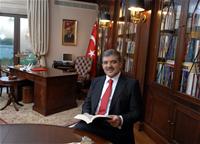 "Like the United States, Turkey cannot remain indifferent to the developments in our region. Hence, accusing Turkey of shifting its Western orientation because of its result-oriented and constructive initiatives, say, in the Middle East is no different than us blaming the U.S. for abandoning its trans-Atlantic ties because of efforts to address the challenges in the Pacific".
"Like the United States, Turkey cannot remain indifferent to the developments in our region. Hence, accusing Turkey of shifting its Western orientation because of its result-oriented and constructive initiatives, say, in the Middle East is no different than us blaming the U.S. for abandoning its trans-Atlantic ties because of efforts to address the challenges in the Pacific".
And although his half-an-hour-long speech before the discussion was entirely focused on Turkey's relations with the US, these words are obviously directed to everyone. An interesting element of the discussion was the fact that almost all questions from the audience were related to Ankara's relations with the EU. Asked about Turkey's reaction to the growing anti-Islamic sentiments in Europe and, to some extent, in the US, Adbullah Gul explained that the discussion on the matter today has political roots. "That's where the lack of tolerance comes from. And I think that is the danger that is associated with the discussions today".
Regarding the membership in the EU, the Turkish president said that for Turkey this still was a strategic goal. "Unfortunately on the European side, there is sometimes a political attitude to slow down Turkey's accession process to the EU. And most of this arises from domestic political considerations in the European countries. And I can say very openly and clearly to you here that Europe today lacks a strategic vision, a strategic perspective for what it wants to be 50, 60 years down the road".
These words of Adbullah Gul sound like a sending back the ball into the European playground. According to Sinan Ulgen, however, Turkey will never join the EU, unless accession turns into a government sponsored vision. The politicisation of the accession process and the polarisation of Turkey’s political system has been as damaging to Turkey’s EU ambitions as the faltering of the EU's commitment. Turkey must rebuild a pro-EU domestic political alliance that includes at least parts of the political opposition.
The researcher makes several recommendations:
- The Turkish government must adopt a much more ambitious agenda for democratic reforms, including steps to ensure the full independence of the judiciary, the lowering of barriers to political representation and a further strengthening of the freedoms of expression and association;
- The Turkish opposition must return to a more EU friendly political message;
- The EU must re-engage with Turkey’s political opposition;
- The EU must redouble its efforts to unblock the Cyprus stalemate. In particular, the EU must finally live up to its promise to enable the Turkish Cypriots to trade with the rest of the EU;
- The Turkish government, with EU support, must implement an internal and external communications strategy for EU accession.
What will happen if the EU does not comply with these recommendations?
It is obvious that Turkey is doing very well both economically and politically in an important for the EU region as well. Given the specifics of the Turkish culture, politics, history and values it is not impossible to assume that if things are left like this, Turkey will very soon start asking itself the question - why do we need the EU. Furthermore, although sometimes tensed, the relations with the US are very good. Turkey has an opinion of its own on many regional issues which it defends vigorously, without worrying of severing relations with one or another ally.
The political class in Ankara has a clear vision and a programme for the development of the relations with the countries in the region, and not only them. This is happening regardless of or even in spite of the European perspective. After all, Turkey has chosen a path, which to some extent is being influenced by its relationship with the EU, but it is an own path. The question is however, that in order the Union to be able to maintain good relations with the 70-million Muslim state, it wouldn't be 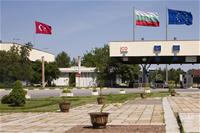 bad if it could start looking for the answer of the question - what are we doing with Turkey?
bad if it could start looking for the answer of the question - what are we doing with Turkey?
An interesting element of the search of this answer is a statement of the former French ambassador to Bulgaria Etienne de Poncins. In the end of his term in Sofia he said that many European countries would want to hear Bulgaria's position on Turkey's EU membership. The reason is quite simple - Bulgaria is a direct neighbour and has a long history of relations with Turkey. Not a small period of this history is not a positive sentiment, which is why Sofia's opinion is expected. If it is not received, a decision will be taken which might touch Sofia much stronger than Brussels, Paris or London.
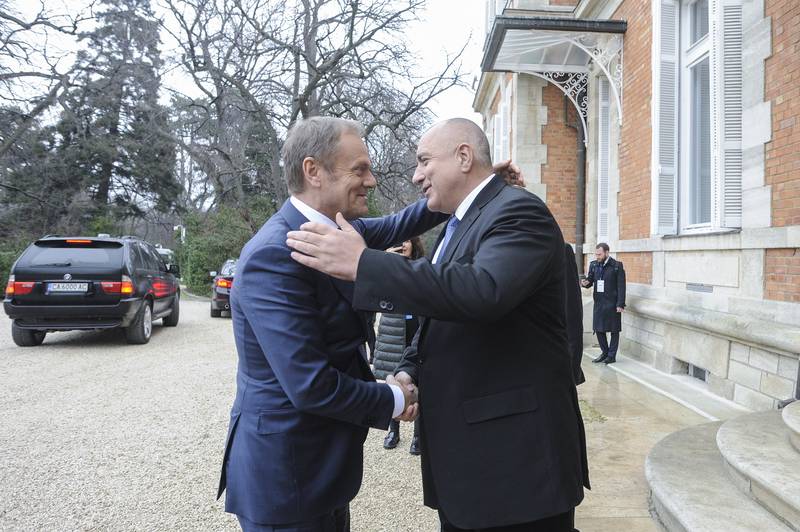 Donald Tusk, Boyko Borissov | © Council of the EU
Donald Tusk, Boyko Borissov | © Council of the EU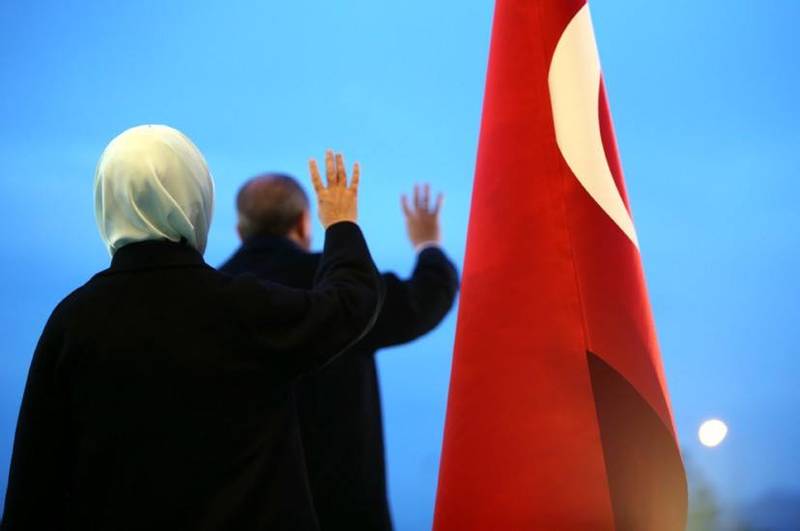 | © Turkey Presidency
| © Turkey Presidency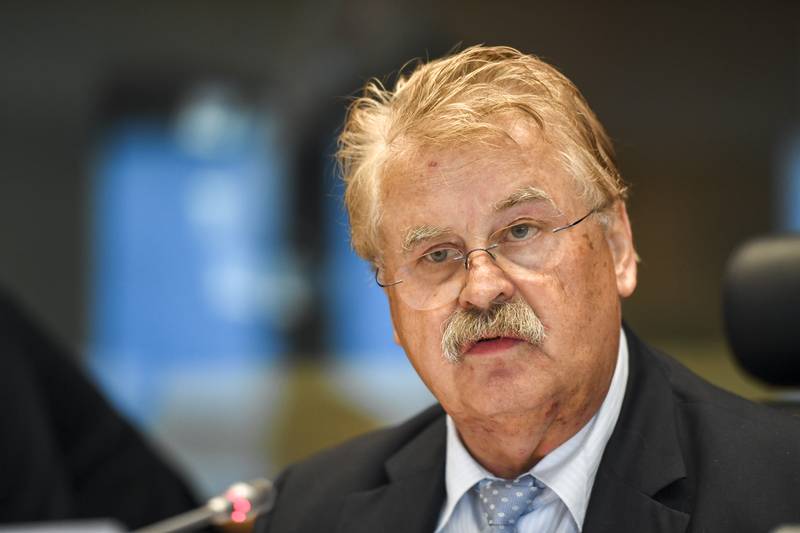 Elmar Brok | © European Parliament
Elmar Brok | © European Parliament